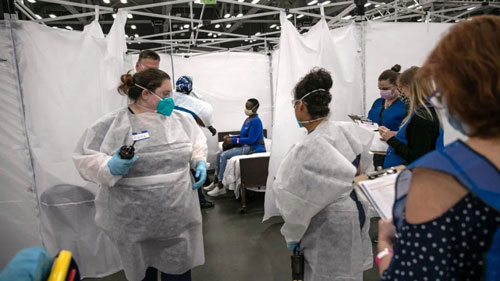A new three-part journal series published Monday explores the significant impact COVID-19 can have on the heart. Nearly a quarter of hospitalized coronavirus patients experience myocardial injury and many develop arrhythmias or thromboembolic disease. Those with preexisting cardiac conditions, like hypertension, diabetes, obesity, or high cholesterol, have a greater risk of worse outcomes with COVID-19.
A three-part journal series, published in the Journal of the American College of Cardiology Monday, takes a deeper dive into the impact COVID-19 has on the heart. Though COVID-19 was originally thought to be a respiratory infection, it’s since become clear the infection threatens the heart, too. Nearly a quarter of people hospitalized with COVID-19 develop myocardial injuryTrusted Source or injury to the heart tissue. A significant number of COVID-19 patients have also developed thromboembolic disease or blood clots and arrhythmias.
Those with preexisting cardiac issues — like hypertension, obesity, high cholesterol, and high blood sugar levels — have a greater risk of experiencing worse outcomes with COVID-19. “As the COVID-19 pandemic has evolved, research has progressively demonstrated this virus’s impact on multiple organs of the body including the heart,” says Dr. Aeshita Dwivedi, a cardiologist at Lenox Hill Hospital in New York City.
Given the significant damage COVID-19 can inflict on the heart, the authors recommend people who have a preexisting heart condition make heart-healthy lifestyle changes now to offset their risk of complications if they were to contract COVID-19.
COVID-19 is thought to damage the heart in two ways. First, the infection can lead to widespread inflammation throughout the body, which can hurt the functioning of the heart.
“COVID-19 infection triggers inflammation in the body that may lead to weakening the heart muscle, abnormalities of the heart rhythm, and even cause clot formation in blood vessels,” says Dwivedi. Second, the virus may directly invade receptor cells, known as ACE2 receptors, within the myocardial tissue and cause direct viral harm.
“It also can affect the heart muscle itself through inflammation or direct invasion of the heart muscle cells and lead to significant heart failure,” says Dr. Benjamin J. Hirsh, the director of preventive cardiology at Northwell Health’s Sandra Atlas Bass Heart Hospital in Manhasset, New York. According to the researchers, the amount of damage inflicted on the heart depends on the amount of viral inoculum, or infecting dose of virus, a person’s immune response, and the presence of comorbidities.










